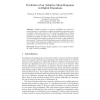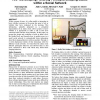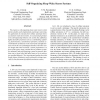524 search results - page 1 / 105 » Artificial Organisms That Sleep |
ECAL
2003
Springer
15 years 7 months ago
2003
Springer
Populations of artificial organisms live in an environment in which light is cyclically present (day) or absent (night). Since being active during night is non-adaptive (activity c...
118
click to vote
ECAL
2007
Springer
15 years 6 months ago
2007
Springer
Adaptive responses to resource availability are common in natural systems. In this paper we explore one possible evolutionary cause of adaptive sleep/wake behavior. We subjected po...
110
click to vote
CSCW
2008
ACM
15 years 4 months ago
2008
ACM
Within a group of peers, it is often useful or interesting to know whether someone in the group has gone to bed or whether they have awakened in the morning. This information, nat...
106
Voted
SASO
2008
IEEE
15 years 9 months ago
2008
IEEE
We propose a self-organizing sleep-wake sensor system that is scalable, easily implemented, and energy conserving. An application of concepts from cellular automata theory account...
114
click to vote
ECAL
2005
Springer
15 years 8 months ago
2005
Springer
In this paper, we describe an approach to artificial life, which uses Qualitative Reasoning for the simulation of life within a 3D virtual environment. This system uses qualitative...




